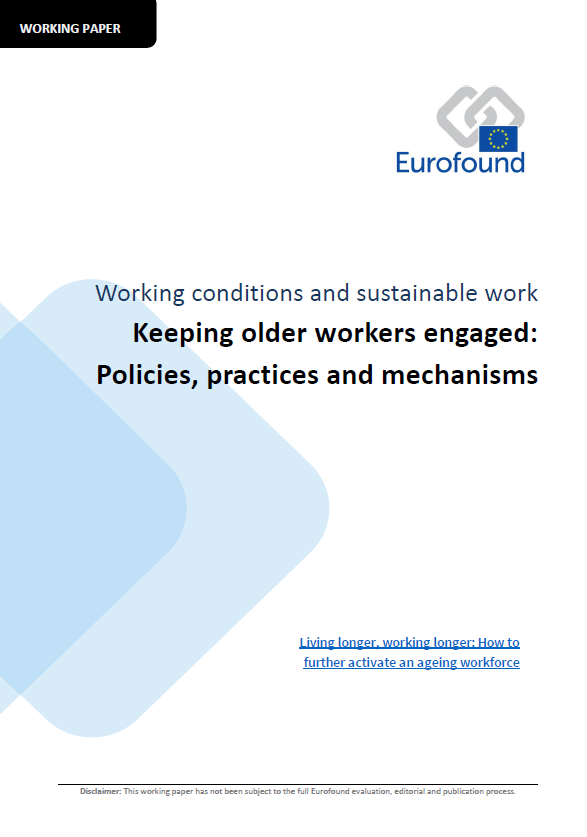EU context
Pomimo znacznego wzrostu wskaźnika zatrudnienia starszych pracowników w ostatnim dziesięcioleciu w wielu krajach UE, we wspólnym sprawozdaniu o zatrudnieniu Komisji Europejskiej za 2017 r. podkreślono, że wskaźnik ten ma potencjał do dalszego wzrostu. W 2016 r. wskaźnik zatrudnienia wynosił 55,3% w przypadku starszych pracowników w wieku od 55 do 64 lat w porównaniu z 66,6% w przypadku wszystkich pracowników w wieku od 15 do 64 lat. Największy wzrost odnotowano wśród starszych kobiet.
Europejski filar praw socjalnych stanowi ramy dla wspierania rynków pracy w procesach dostosowania się do nowych wyzwań, jednocześnie propagując sprawiedliwość i solidarność między pokoleniami. Podkreśla on prawo pracownika do środowiska pracy dostosowanego do jego potrzeb zawodowych dla umożliwienia mu przedłużenia jego uczestnictwa w rynku pracy. Co więcej w niedawnym niezależnym porozumieniu europejskich partnerów społecznych dotyczącym aktywnego starzenia się i podejścia międzypokoleniowego zobowiązano się do ułatwienia starszym pracownikom aktywnego uczestnictwa i dłuższego pozostawania na rynku pracy.
Działalność Eurofound
Eurofound posiada gromadzoną na przestrzeni wielu lat specjalistyczną wiedzę na temat problemów starzejącej się siły roboczej. Badania prowadzone od lat 90. dotyczyły głównie uczestnictwa w rynku pracy, wydajności pracy, warunków pracy i preferencji starszych pracowników dotyczących pracy w kontekście politycznym zmieniającego się profilu demograficznego Europy. Prace koncentrowały się również na wsparciu publicznym i inicjatywach na poziomie przedsiębiorstwa wspierających zatrudnienie starszych pracowników. W ramach badań gromadzono informacje dotyczące zatrudnionych starszych kobiet ze szczególnym uwzględnieniem rosnącego wskaźnika zatrudnienia w tej grupie oraz ich rosnącego udziału w sile roboczej, zwłaszcza w grupie wiekowej 55–64 lata.
Dane z badań
Kompleksowe badania Eurofound dostarczają szeregu danych na temat sytuacji starszych pracowników. Szóste europejskie badanie warunków pracy (EWCS) dotyczy sposobu, w jaki starsi pracownicy odnajdują się w różnych wymiarach jakości pracy. Chociaż w przypadku starszych pracowników prawdopodobieństwo utraty pracy jest niższe niż w przypadku młodszych pracowników, według danych badania starsi pracownicy uważają, że gdyby stracili pracę, nie znaleźliby nowej, podobnie płatnej, a nawet mieliby trudności z ponownym wejściem na rynek pracy.
W badaniu na podstawie piątego europejskiego badania warunków pracy (EWCS) Eurofound określiła cechy charakterystyczne starszej siły roboczej i pracy w różnym wieku, a także czynniki, które zapewniają starzejącej się sile roboczej trwałą pracę: dobre warunki pracy, dobre samopoczucie fizyczne i psychiczne oraz równowagę między życiem zawodowym a prywatnym.
Europejskie badanie jakości życia Eurofound (EQLS) dostarcza ustaleń na temat wieku w odniesieniu do różnych wymiarów jakości życia w Europie. W analizie preferencji ludzi po 50 roku życia dotyczących pracy wykorzystane zostały ustalenia zawarte w trzecim EQLS i pokazano, że wielu starszych pracowników woli przepracowywać mniej godzin, nawet po uwzględnieniu ich potrzeb finansowych. Umożliwienie lepszego dostosowania liczby godzin pracy do ich preferencji może umożliwić dłuższą pracę i zmotywować ludzi do dłuższej pracy.
Dłuższa aktywność zawodowa
Eurofound dołączyła niedawno do trzech innych agencji UE gromadzących dane na temat pracy przyjaznej dla osób starszych w Europie, wyzwań politycznych związanych ze starzeniem się siły roboczej i innowacyjnych rozwiązań.
Wielu pracowników nie jest w stanie pracować aż do osiągnięcia ustawowego wieku emerytalnego lub nie ma do tego motywacji. Istnieje jednak grupa, która jest w stanie i chce pracować po przekroczeniu tego wieku. Eurofound zbadała rosnące zjawisko podejmowania pracy po przejściu na emeryturę.
W najnowszych badaniach uwagę poświęca się wydłużaniu życia zawodowego dzięki elastycznym systemom emerytalnym, a w szczególności systemom częściowych emerytur, które mogą to ułatwić. Również przeglądy przebiegu pracy zawodowej mogą przyczynić się do dłuższej aktywności zawodowej. W badaniach przeprowadzono analizę sposobu, w jaki takie przeglądy mogą pomóc w pełnym zrozumieniu możliwości, jakie maja pracownicy, aby pozostać aktywnymi zawodowo do czasu osiągnięcia późniejszego wieku emerytalnego.Badania te wskazują różne instrumenty opracowane przez przedsiębiorstwa w celu zatrzymania starzejących się pracowników.
W ramach innych badań dokumentowane są krajowe i sektorowe inicjatywy rządów i partnerów społecznych, mające na celu zatrzymanie starszych pracowników na rynku pracy, w tym zachęty finansowe i polepszenie warunków. W ramach wcześniejszego projektu przeanalizowano inicjatywy zarządzania wiekiem wprowadzone przed recesją i po niej w celu podkreślenia dobrych praktyk w przedsiębiorstwach europejskich.
Zasoby
- Wizualizacja danych: Szóste europejskie badanie warunków pracy
- Wizualizacja danych:Czwarte europejskie badanie jakości życia
- EurWORK: Regularne aktualizacje na temat starzenia się i pracy na poziomie krajowym
- Baza danych studium przypadku starzejącej się siły roboczej: Przykłady dobrej praktyki w odniesieniu do takich kwestii, jak rekrutacja, szkolenia i rozwój, elastyczna praca, zdrowie, ergonomia itp.
- Karty informacyjne na temat „Living longer, working better” (Żyjąc dłużej, pracując lepiej), obejmujące okres od 2011 r. do chwili obecnej, znajdują się na stronach: Ludzie starsi a wolontariat, Praca po przejściu na emeryturę, Starsi pracownicy w recesji i Propagowanie dobrych warunków pracy
- Wpływ recesji na politykę zarządzania wiekiem – studia przypadków i sprawozdania krajowe
















